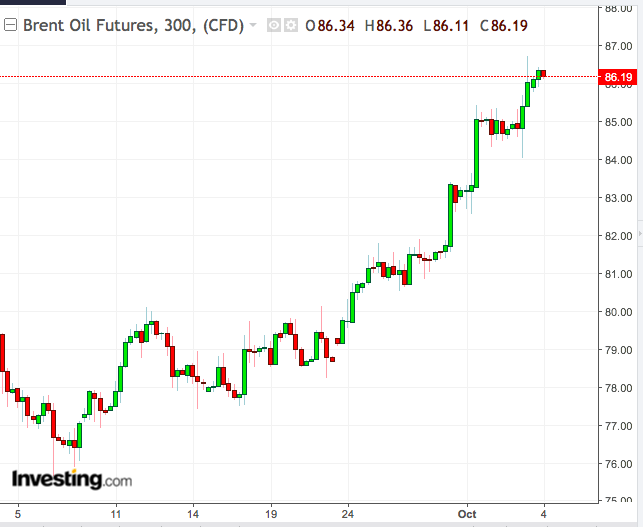Right now, the two most important factors affecting oil markets are fear and speculation based on that fear. The fear is that at some point over the next several months there will not be enough oil available on the global market to fully satisfy customer demand. The speculation is that this fear will push oil prices into the triple digits. But are these concerns in line with reality?

Hedge funds and major oil trading houses are all betting that the United States, Saudi Arabia, the UAE, Iraq, Kuwait and Russia will not be able to produce and export enough barrels of oil to offset the decline in oil production and exports from Venezuela and Iran over the next few months. These positions have caused the Brent benchmark to gain 4.82% and WTI to jump by 5% over the past 7 days.
The fear of this hypothetical supply and demand imbalance is overriding fundamental indications that the oil market is well balanced at present and that there will be enough supply to accommodate demand. Platts reported that Saudi oil minister Khalid al Falih told attendees at the Russia Energy Week Forum this week that, “there is not a single customer who has requested a barrel since June that hasn’t been supplied.” This may be true, but the price of Brent has risen 10% since the beginning of July, indicating that the market is largely controlled by speculation and fear, not supply and demand.
U.S. President Donald Trump’s recent remarks directed towards OPEC and Saudi Arabia reflects his frustration with the recent increase in oil prices. Average gasoline prices in the United States are nearing the $3 per gallon mark and there is still more room to rise between now and the midterm elections.
When it comes to supply, the truth is that Saudi Arabia and Russia are delivering, both in messaging and in oil, but the market seems to be ignoring it. OPEC and its non-OPEC partners may not have formally indicated that an increase in oil production is warranted at the group’s most recent meeting in September, but in reality, the big producers are singing a different tune.
Khalid al Falih announced on Wednesday morning that Saudi Arabia’s October production has already increased to 10.7 million barrels per day. This reflects an increase of 200,000 to 300,000 barrels per day from September.
Likewise, Russia announced that its production rose 150,000 barrels per day in September and Vladimir Putin said that Russia could increase production by another 300,000 barrels per day.
There are also indications that Saudi Arabia, Kuwait and Chevron (NYSE:CVX) are coming to an agreement that would restart oil production in the neutral zone area between Saudi Arabia and Kuwait. Reports are conflicted on whether oil production would come online immediately following an agreement or whether it would take at least 6 months to get the area up and running again.
Market speculators seem to be ignoring this information, as oil prices continued to rise as this news was being reported.
There are also bearish indications for oil on the demand side, but the market is ignoring them as well. The EIA’s weekly data showed a build in oil stockpiles in the U.S. This kind of information would typically result in a decline in prices, but it did not. Gasoline inventories in the United States are also at record highs for this time of year, which indicates that refineries may soon decrease their crude oil purchases until the inventory is used up. Europe is entering its refinery maintenance season and crude oil draws should reflect a drop in demand, but the market is ignoring this information.
Fear and speculation regarding the Iran sanctions can only buoy the oil market so far. At a certain point, the supply situation will be clear and the fear factor will dissipate. We are left with two questions.
How high can prices be pushed? And when will this bubble pop?
